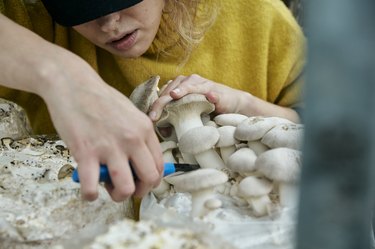
Oyster mushrooms (Pleurotus spp.) are a tasty addition to stir fries and other dishes. Found in the wild in Asia, Europe and North America and grown in mushroom kits by enthusiasts, it is important to clean and store oyster mushrooms properly to retain their flavor. These tasty mushrooms should be used as soon as possible for best results in your favorite recipe.
About Oyster Mushrooms
Video of the Day
The pearl oyster (Pleurotus ostreatus), Indian or Italian oyster (Pleurotus pulmonarius) and aspen oyster (Pleurotus populinus) mushrooms, all commonly known as "oyster mushrooms," are among the more than 200 Pleurotus species found worldwide. Oyster mushrooms have a wavy margin, similar to oysters. The caps can be white, gray, bluish, tan, yellow or pink, depending on the species.
Video of the Day
Wild oyster mushrooms grow on decaying trees and if found on the forest floor, they're thriving on the dead tree roots just under the surface of the soil. If you prefer to grow your own, a variety of oyster mushroom kits for do-it-yourselfers are available. Depending on the manufacturer, the kit may contain golden oyster (Pleurotus citrinopileatus), blue oyster (Pleurotus ostreatus columinus) or other oyster mushroom species. Some kits use a pre-planted substrate in a bag, while others use logs that are already planted with the mushroom spores.
Cleaning and Washing Mushrooms
Oyster mushrooms are about 90 percent water so washing them won't hurt them; just be quick about it. First, remove the lower part of the stem that was in contact with the soil or growing medium and any hard or woody areas; discard those pieces. Use a mushroom brush or paintbrushes of varying bristle stiffness to clean the mushrooms. Use a toothpick to remove any lingering debris from the gills.
Remove insects by gently tapping the cap, waiting for a second or two, then tapping again. Compressed air helps blow the bugs away from the caps and gills, but be careful to avoid damaging the mushrooms.
You can also use a damp cloth to clean the mushrooms or, if you need to wash a large number at one time, put them in a colander and give them a quick rinse to remove any dirt, debris or insects. After rinsing, immediately pat and press gently between paper towels to remove the excess moisture, especially if you're using them immediately in frying, to avoid spattering.
Storing Oyster Mushrooms
Oyster mushrooms should be used as soon as possible to retain their mild flavors. To store for up to seven days, place the cleaned mushrooms in a paper bag or plastic storage container in the refrigerator. Do not tightly close the bag or container lid. Clearly label the date on the outside of the package to be sure that you use the mushrooms while still fresh.
Using Oyster Mushrooms in the Kitchen
The smallest oyster mushrooms are often used whole or sliced in half, while larger caps may be sliced or, in some cases, left whole or in larger pieces for breading and pan-frying. The tender caps may also be torn into pieces and added to the pan or wok. If using in a recipe that requires an extended period on the stove or in the oven, add the mushrooms at the last stage of the process.
Sauté oyster mushrooms in butter or oil, then add to cream sauces to pour over pasta or chicken. Shred, season and sauté mushrooms with adobo or taco spices for vegetarian tacos. Marinade larger oyster mushroom for a few minutes in buttermilk, then dip in a spicy flour mixture or buttermilk batter and air-fry for a tasty snack that resembles fried chicken.